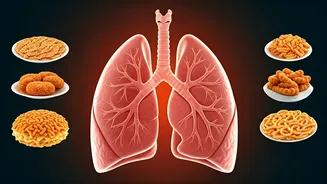Processed Meats' Impact
Processed meats, often a staple in quick meals, are linked to impaired lung function. These foods, including sausages and bacon, frequently contain nitrates
and nitrites. These additives, used for preservation and color enhancement, have been associated with inflammation in the respiratory system. Studies suggest that regular consumption of processed meats may worsen asthma symptoms and increase the risk of chronic obstructive pulmonary disease (COPD). The high salt content also contributes to fluid retention, which can further strain the lungs. To protect your lungs, consider limiting your intake of processed meats and opting for fresh, unprocessed alternatives whenever possible. Prioritize a diet rich in whole foods to support respiratory health.
Dairy's Potential Effects
Dairy products, while a source of calcium, can sometimes trigger or exacerbate respiratory issues. Many individuals find that dairy consumption increases mucus production. Excessive mucus can clog airways, making breathing harder. For those with asthma or allergies, this effect can be particularly pronounced, leading to increased coughing and wheezing. Furthermore, the proteins in dairy can sometimes provoke an immune response, causing inflammation in the lungs. If you experience respiratory problems, try reducing your dairy intake to see if it makes a difference. Explore alternative sources of calcium, such as leafy greens and fortified plant-based milk, to ensure your nutritional needs are met without compromising your respiratory health. Consider tracking your symptoms in relation to your dairy intake to pinpoint any potential sensitivities.
Sugary Drinks' Risks
Sugary drinks, including sodas, fruit juices, and sweetened teas, offer minimal nutritional value but can indirectly harm lung health. High sugar intake is associated with weight gain, which can place extra pressure on the lungs. Obesity can restrict the diaphragm's movement, making it harder to breathe. Moreover, excess sugar can contribute to systemic inflammation, which can affect the respiratory system. In addition, the empty calories in these beverages can displace nutrient-rich foods that are vital for overall health, including lung function. Choosing water, unsweetened tea, or naturally flavored beverages is a better approach to stay hydrated and support healthy lungs. Be mindful of hidden sugars in seemingly healthy drinks, and prioritize natural whole foods.
Fried Foods and Lungs
The process of frying foods often produces trans fats and compounds harmful to respiratory health. These foods are generally high in unhealthy fats, which can increase inflammation throughout the body. The airways can become inflamed, making breathing more difficult. Furthermore, fried foods are often heavily processed and can lead to weight gain, which negatively affects the lungs. Moreover, these foods can trigger acid reflux, which can irritate the airways and cause coughing or wheezing. If your goal is to protect your lung health, try replacing fried foods with healthier cooking methods, such as baking, grilling, or steaming. Focus on incorporating wholesome and nutritious foods into your diet to support overall health and lung function.
Salty Foods' Impact
Excessive sodium intake, common in many processed foods, can lead to fluid retention throughout the body, including in the lungs. This can cause the lungs to work harder, leading to breathlessness. High-sodium diets can also worsen existing respiratory conditions. Salt can cause constriction of blood vessels, which in turn elevates blood pressure and strains the lungs. Many pre-packaged foods are loaded with hidden sodium; therefore, reading food labels carefully is crucial. To safeguard lung health, it's beneficial to limit sodium consumption by cooking at home more often and utilizing fresh ingredients. When consuming processed foods, check the sodium content and opt for low-sodium choices whenever possible. Season foods with herbs and spices instead of salt to enhance flavor without the negative effects.
Refined Carbohydrates' Effects
Refined carbohydrates, like white bread and pastries, can contribute to lung issues. These foods are quickly converted into sugar in the body, leading to an increase in blood sugar levels. This can trigger inflammation, which may negatively affect the respiratory system. They often lack essential nutrients and fiber, leading to weight gain and further straining lung function. A diet rich in refined carbohydrates may also decrease the intake of nutrient-dense foods vital for overall health. Consider swapping refined carbohydrates for whole-grain options and incorporating a variety of fruits, vegetables, and lean proteins to support overall health and lung function. Pay attention to how your body reacts to these foods and make adjustments to support healthy breathing.
Alcohol's Respiratory Effects
Excessive alcohol consumption can negatively impact lung health. Alcohol can impair the immune system, making the lungs more vulnerable to infections. Alcohol can also cause inflammation, potentially worsening existing respiratory conditions. Additionally, alcohol can suppress the gag reflex, increasing the risk of aspiration pneumonia, where food or liquid enters the lungs. Alcohol is also a dehydrating agent, which can cause increased mucus production, further complicating respiratory function. Moderation is key when it comes to alcohol consumption to maintain lung health. If you experience respiratory problems, consider reducing or eliminating alcohol consumption, and consult a healthcare professional for personalized guidance.












